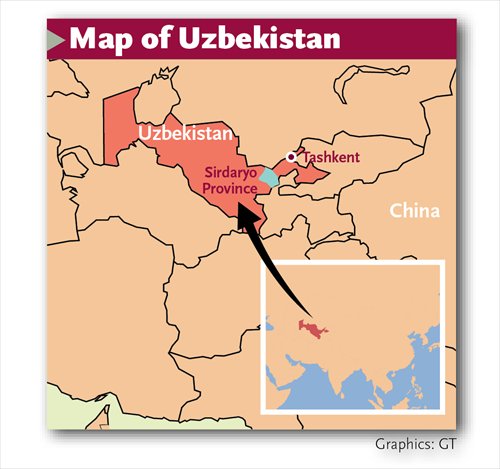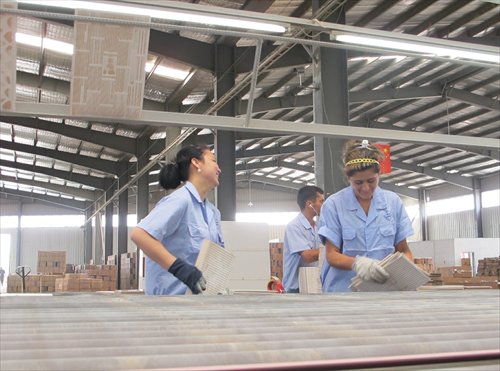New frontiers


Uzbek employees are working at a ceramic tile factory in the Peng Sheng Industrial Park on June 6, 2014. Photo: Wang Wenwen/GT
A place full of history is never short of stories. As the cities of Uzbekistan sparkle under the sun like pearls dispersed along the ancient Silk Road, these cities that used to be connected with China via the Silk Road in the past are still vigorously trading with their eastern neighbor.
Yan Yaoyong, a Chinese living in Tashkent, capital of this Central Asian state, for more than 20 years, has witnessed the growing-up of Chinese enterprises, especially private ones, in the country since its independence in 1991. He said the fastest expansion took place after the two countries became strategic partners in 2012 with business focusing on oil, natural gas, telecom and leather products.
Chinese businesses
Yan runs a travel agency in Tashkent, mainly accommodating customers from China, as he has seen more Chinese people coming to do business or travel here. He told the Global Times that the Uzbek market is changing fast, and a successful company must be able to adapt to the market.
Among all private Chinese companies in the nation, the best job has been done by the Peng Sheng Industrial Park.
The industrial park was jointly established by Wenzhou Jinsheng Trade Co and Uzbek business partners in 2009 in Sirdaryo Province, which is located in the center of the country and 70 kilometers from the capital. It covers an area of 370,000 square meters, and has seven factories producing ceramic tiles, leather, shoes, mobile phones, taps, casing and pet food.
All these factories are operated by private companies from Wenzhou, an entrepreneurial hub in East China's Zhejiang Province. Eighty percent of the employees are Uzbek locals, and the rest are Chinese at managerial levels from China's coastal provinces such as Zhejiang and Fujian which helped drive China's opening-up to the international market and its economic growth in the past few decades.
According to Wang Xinghe, general manager of the industrial park, the ceramic tiles are mainly sold to the Central Asian market, leather products are exported to China to be further processed, and the tap factory exports its goods to the Turkish market and is planning to expand its business to the European market.
"The Chinese people bring their business intuition to this land, which vitalizes the economic lifeline of the Silk Road," Wang said. "We make products according to the market demands."
The story of the ancient Silk Road is still inspiring. That's why in September, Chinese President Xi Jinping proposed the concept of the "Silk Road economic belt" that aims to strengthen regional economic cooperation.
As Feng Yujun, director of the Institute of Russian Studies at the China Institutes of Contemporary International Relations, believes, this is also a way for China to realize economic transformation, as more companies can expand out of the country given the domestic problem of excessive production capacity.
Ripe conditions
Conditions are ripe for Chinese companies in going overseas and the Uzbek market features some positive elements.
Most Chinese businessmen in Uzbekistan consider its people friendly, which is not always the case in some other Central Asian states where xenophobia remains strong. This makes management of local staff easy, and many Uzbek employees are loyal to their Chinese companies.
Thirty-six-year-old Sergey Chursin works for the Tashkent branch of Huawei Technologies Co, the leading private Chinese telecommunications equipment manufacturer. He worked as an engineer, and now he is head of the human resources department.
"At the beginning, Huawei was not a big company, but now it is a world brand. I grew up with Huawei. I made the right choice," Chursin told the Global Times.
Difficult issues
Nonetheless at the same time, difficulties exist as well.
Yu Hongkai, sales director responsible for the Central Asian market of Shandong Kerui Holding Group Co, a private company that provides petroleum equipment, told the Global Times that the biggest obstacle of doing business in Uzbekistan is the government's tight control over foreign exchange.
"It is a headache when you have made money here but you cannot take it back to China. The efficiency of the banks is low, and the entire country is short of dollars. If a company sends money to China, which is always a large sum, it will have to suffer huge losses," Yu told the Global Times.
Liu Qian, an assistant research fellow at the Academy of Chinese Energy Strategy with the China University of Petroleum in Beijing, said the issue of foreign exchange is a common problem faced by Chinese companies in Uzbekistan. Therefore, they have to adhere to Uzbek policies on the one hand, and on the other hand they can be flexible and evade market risks.
Peng Sheng has done a smart job in this. It buys raw materials such as cow skins and lamb skins with local currency. The first layer can be used to make operation thread, the second can be made into casing, and the third can be processed into fur. All these products will be exported to countries like China, which successfully turns local currency into US dollars.
Meanwhile, unlike Peng Sheng which focuses on light industry, companies like Kerui that trade in the energy sector needs to take the regional strategic situation into consideration.
"Energy belongs to strategic resources. Overseas energy companies, even when they have no government background, have to bear in mind the broader geopolitics," said Wang Bin, vice president of Kerui, who watches the Central Asian and South Asian markets closely.
On May 29, Russia, Belarus and Kazakhstan signed the Eurasian Economic Union Treaty, which will enhance their cooperation based on the Customs Union, including the free flow of commodities, services, capital and labor.
Wang said that Central Asian countries will deepen cooperation with Russia in the future. One reason is that Russia is assertive in trying to get what it wants. Wang also said another reason is that many Central Asian leaders, such as Uzbekistan President Islam Karimov, used to be members of the Politburo of the Central Committee of the Communist Party of the Soviet Union and still hold pro-Russian feelings.
China needs to ease both regional and international concerns, which make building the "Silk Road economic belt" a challenging task, said Wang.
Newspaper headline: Chinese firms face opportunities, challenges in Uzbekistan